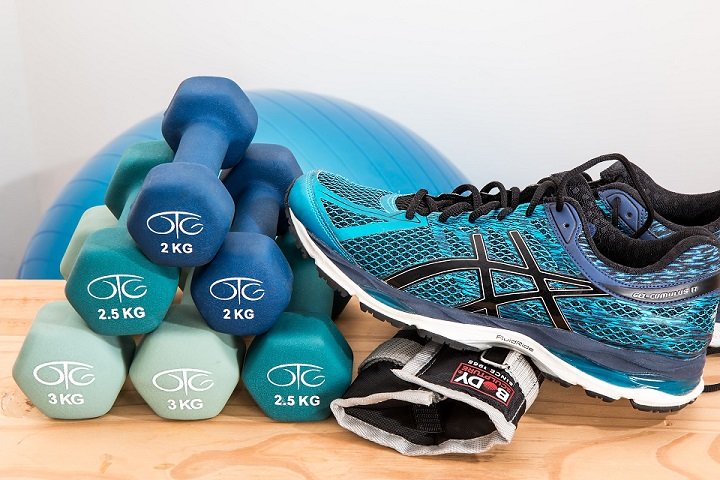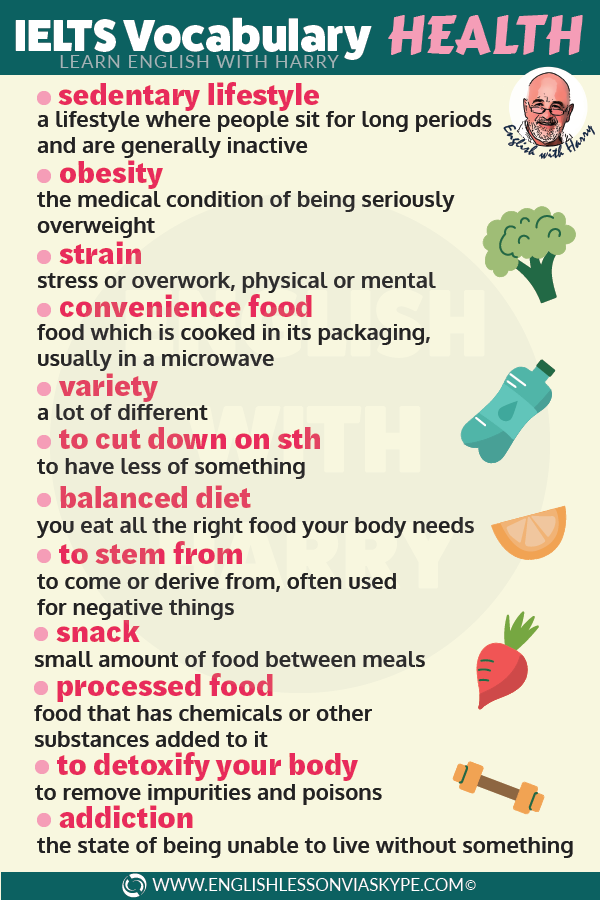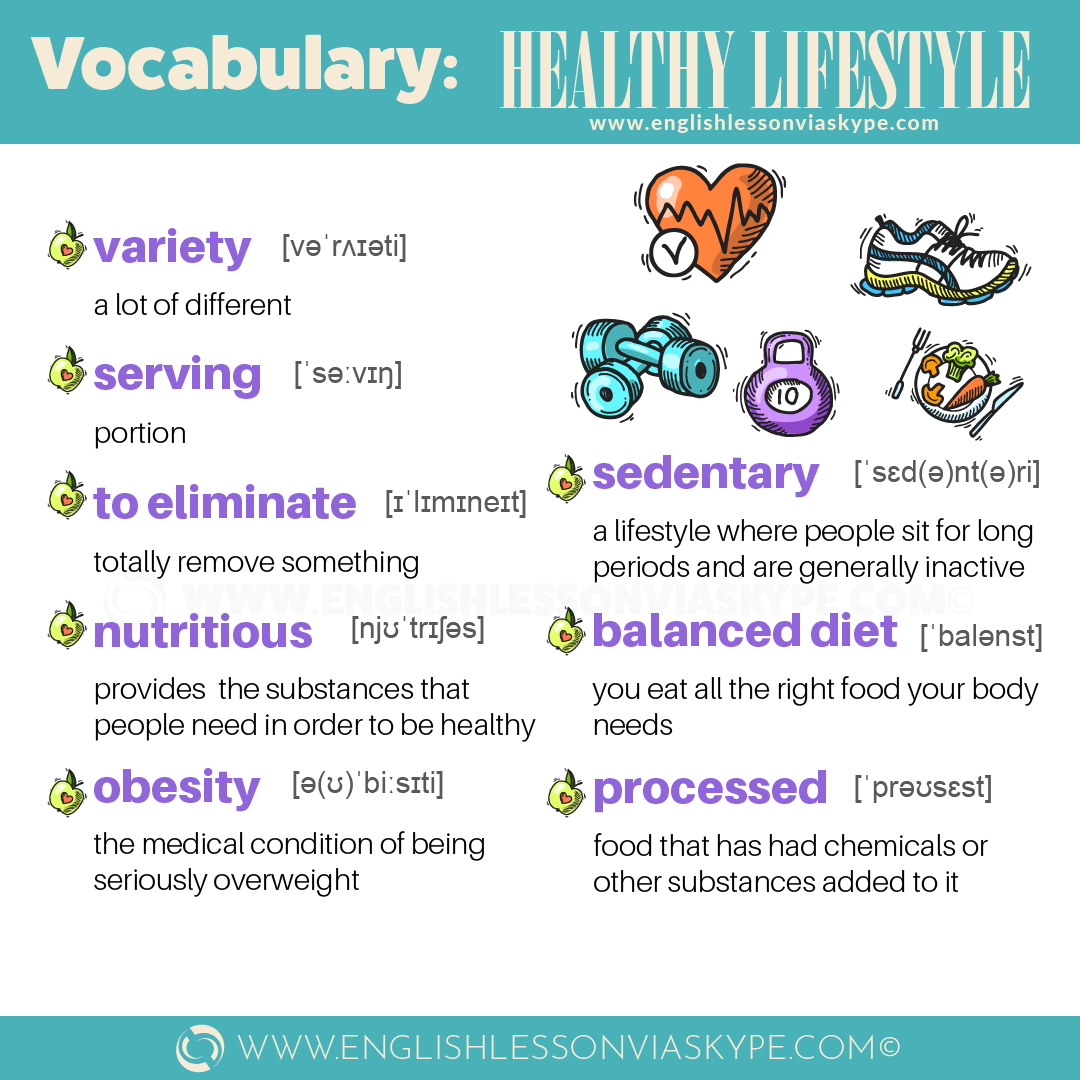Questions on health and fitness come up regularly in the IELTS exam so it’s a good idea to learn some common health vocabulary.
You may be asked to talk about health issues or write about them, and health and fitness could also be the topic of your reading or listening tests.

To help you with this, I’ve included four things on this page:
- A list of common health vocabulary with
definitions & sample sentences
- IELTS-style questions on the topic of health and fitness
- Sample answers
- Links
to online reading and listening resources
You’ll find
PDF downloads of both the questions and sample answers, and the health vocabulary
list, at the bottom of the respective sections.
We’ll start with the questions and answers.
The questions relate to the Speaking test because this part of the exam offers the broadest range of possible questions on the topic of health and fitness. They give the best opportunity for me to demonstrate the vocabulary and for you to practise using it.
Below you will find IELTS-style questions and answers for all three parts of the Speaking test. I’ve highlighted key words and phrases in bold.
You’ll find these words and phrases, and many others, in the vocabulary list beneath. The list also includes explanations and sample sentences and there is an audio to listen to pronunciation.
The health vocabulary list contains words and phrases relevant to all parts of the IELTS exam.
Finally, at the bottom of the page I’ve added links to topical articles,
short videos and podcasts that will help you to improve both your health vocabulary and your reading and listening skills.
Here’s something to think about as you work through this page:
Learning vocabulary for IELTS isn’t just about learning new words and phrases, but about how you use vocabulary to develop good answers.
IELTS-Style Speaking Test Questions and Answers
Common health vocabulary is highlighted in bold.
Part 1
1) What do you do to stay healthy?
I eat a balanced diet with lots of fresh fruit and vegetables and take some form of exercise every day. I also make sure that I get enough sleep.
2) Do you get ill very often?
Fortunately, I’m very healthy and rarely get ill, although I occasionally catch a cold in the winter.
3) Is there anything you’d like to improve about your fitness?
I really want to take up yoga because I often feel stiff after exercise and I think it would help. It would also make me more flexible and less likely to get injured when I work out.
4) Are you careful about what you eat?
I try very hard to have a healthy diet, even when I eat out at a restaurant. I rarely buy takeaways and when I go out with friends for fish and chips, I only have the fish with some peas.
5) How important is a healthy lifestyle for you?
It’s one of the most important things for me because I want to feel good and to enjoy life. If you don’t have good health then everything else in life is a struggle.

Part 2
Describe a change you have made to improve your health and that you would recommend to others.
You should say:
- what it is
- why you decided to do it
- how you have benefitted from it
and explain why you would recommend it to others.
I often make changes to my lifestyle to try and look after my health but the one I’d like to tell you about is cutting down on how much meat I eat.
There’s been a lot of stuff in the media about how unhealthy it is to eat too much meat, especially red meat and processed meat. I was already fairly healthy and ate a balanced diet, but when I took up a new sport, which involved vigorous exercise, I started to think that maybe I should try to cut down on it a little. I was particularly concerned about the increased risk of heart disease and of having a stroke. I know a healthy diet can help to prevent these.
I started by cutting out meat one day a week and making a vegetarian meal instead. This was easy so I started doing it twice a week and then for three days. Soon I began to look forward to my non-meat days as I was discovering many delicious foods that I’d never tried before. I also started to eat more fish which has many health benefits.
Within two months I’d lost nearly half a stone in weight. Although I hadn’t actually had a weight problem, it was a nice surprise. Even better, my cholesterol level went down which I was especially pleased about. I certainly felt as fit as a fiddle. Many of my friends who still eat lots of red meat suffer from high cholesterol and I’m sure there’s a connection.
Over time, I’ve found that the less meat I eat, the less I want to eat, and I’m now down to just cooking meat dishes at the weekends. Maintaining this diet is made easier by the fact that I live on my own so can cook and eat whatever I want to without being influenced by anyone else. If I had to cook a chicken casserole or steak pie for my family I don’t think I’d be strong enough to resist eating it myself.
I don’t think I’ll ever cut out meat altogether as I enjoy it too much. I can say, however, that going partly vegetarian has definitely saved me money as meat has gone steadily up in price over the past few years. For this reason, as well as all the others I’ve mentioned, I would definitely recommend cutting down on meat.

Part 3
1) Do you think people have become more health-conscious in recent years?
In my opinion, many people are more concerned about living a healthy lifestyle than, say, ten years ago and understand how to stay fit and healthy. Lots of adults of all ages go to the gym, cycle to work, jog in their spare time or have taken up a sport. The shops seem to offer more healthy eating options every week so the demand is obviously there.
On the other hand, I heard on the news that over 70% of the population of my country is overweight so most people aren’t taking good care of their health. There are lots of programmes on TV about health problems related to obesity and how to change your life and get healthier, so I have to conclude that people are more conscious of health issues these days but that many choose to do nothing to improve them.
2) Why do some people choose to live unhealthy lives?
As someone who tries hard to live healthily, I find it hard to understand why many people chose unhealthy lifestyles. Personally, I think they are in denial over the long-term damage to their health of eating and drinking too much and not taking enough exercise. In many cases, it’s just laziness.
However, I do believe that there are some people who really do want to lose weight and get fit but find it very difficult to change their dietary habits or find the motivation to exercise. I have a work colleague who was so overweight and unfit that he couldn’t play football with his children. He was so upset by this that he went on a diet and started to take regular exercise. He lost over 40kg and is in really good shape now. More importantly, he can now run around with his kids and play football, which they really love.
Sometimes it takes a situation like this or a health scare for someone to make better health decisions.
3) What are the health benefits of playing a sport?
In my view, there are many great health benefits to be gained from taking part in sports activities. Firstly, it helps you to stay physically fit and healthy, and to lose weight if that’s a problem.
Secondly, it’s good for your mental health as it can help to relieve stress and improve work-life balance. I find this myself. I can have a really difficult day at work but when I go out training on the river with my rowing crew in the evening, that stress disappears.
Finally, playing a sport is an excellent way of making new friends as you meet like-minded people who share your interest. Having good friends around you is also good for your mental health. If you play a team sport, training with your teammates pushes you to get fitter, so that’s an added advantage, and it’s fun to work out together.

Click this link to get a PDF download of these practise questions & sample answers.
Download PDF now
Health Vocabulary
* Important
- Do not try and learn this list of health vocabulary.
- Identify the vocabulary you find useful for answering practise questions about health and fitness.
- Record these in your vocabulary notebook and practise using them regularly.
I recommend that you create your own answers to the Speaking
questions on this page. You will find many other IELTS-style practise questions
by searching online.
For help on how to learn vocabulary, what
to learn and how to record it, visit these pages:
How to Learn
Vocabulary for IELTS
Top 6 Types of IELTS Vocabulary & Topic Word Lists
Health Vocabulary – Common Words & Phrases
Key definitions:
health – the physical and mental condition of the body and the extent to which it is free from illness or injury
fitness – the state of being physically fit and healthy.
Health Vocabulary Pronunciation
Health Vocabulary Set 1: Health
healthy diet – mainly eating food that is nutritious and cutting down on sugar and fat.
— Eating a healthy diet can help prevent illness and disease.
health problems (or health issues) – situations where the body is suffering from illness, injury or disease.
— An unhealthy lifestyle can lead to many health problems in old age.
— Smoking and drinking excess alcohol can lead to many serious health issues.
health risk – any factor that exposes a person to the increased chance of experiencing illness, injury or disease such as poor nutrition, alcohol or drug consumption, unsafe water, poor hygiene and sanitation, unsafe sex.
— Binge drinking is a significant health risk and can have many long and short-term consequences.
ill health – suffering from some form of physical or mental illness or disease.
— He had been suffering from ill health for several months before he died.
poor health – the general state of not being in a good condition of health.
— The refugees arrived in a state of poor health having had little food or water for many weeks.
unhealthy – harmful to health or not having good health.
— Smoking is a really unhealthy habit.
— I read in a magazine article that it’s unhealthy to eat too much red meat.
health scare – a state of alarm or anxiety caused by concern about the risk of developing or being diagnosed with a particular illness or condition.
— Suffering chest pains while playing in the park with his kids was a real health scare and prompted him to lose weight and get fitter.
good health – the general state of being in a good condition of health.
— Despite celebrating his 90th birthday, Peter had no medical problems and was in remarkably good health.
healthy lifestyle (or unhealthy lifestyle) – a way of living that contributes to good health and well-being.
— Regular exercise is an important part of a healthy lifestyle.
— His excessive weight and the fact that he gasped for breath when he walked were clues to his unhealthy lifestyle.
health care – the services provided by governments or organisations for the treatment of illness, injury, disease and to maintain well-being.
— Many governments cannot afford to provide free health care for their people.
health education – education that promotes an understanding of how to maintain personal health.
— Basic health education is vital if child mortality in rural African communities is to be reduced.
health-conscious – to be concerned about how your diet and lifestyle are affecting your health and take an active interest in maintaining good health.
— After his sister died young of heart disease, Bill became far more health-conscious and made changes to his lifestyle and diet.
health benefit – the positive effect on a person’s health gained from food, activity, medical treatment or therapy.
— Eating fruit and vegetables has many health benefits.
mental health – the state of a person’s emotional and psychological well-being. The health of the mind.
— Stress or bullying at work can lead to serious mental health problems.
to look after your health / to take care of your health – to eat well, drink alcohol sensibly and take exercise.
— I believe I’m still able to enjoy an active life in my 80’s because I have always looked after my health.
to regain your health – to recover from illness or injury.
— Sunita was very ill with the flu but is gradually regaining her health.
Health Vocabulary Pronunciation
Health Vocabulary Set 2: Fitness
regular exercise – to engage in physical activity often and consistently.
— Taking regular exercise helps to keep the body healthy.
vigorous exercise – intense exercise that causes sweating, heavy breathing and increased heart rate.
— Vigorous exercise helps to keep the heart healthy.
to be unfit – when the body not being in good physical condition, generally due to a lack of regular exercise.
— I gave up going to the gym six months ago and I’ve become very unfit.
prevent – To stop something from happening.
— Keeping fit can prevent a wide range of health problems from developing.
— Governments could contribute to the prevention of health problems by banning the advertising of unhealthy products such as fast food, alcohol and cigarettes.
in good shape – in good physical condition.
— My parents are both in their 70’s but are still in pretty good shape.
stay in shape – to take action to maintain good health and fitness.
— Eating healthily and taking regular exercise helps me to stay in shape.
out of shape – not in good physical condition.
— I got very lazy over the holidays and am really feeling out of shape.
get back into shape – to take action to improve your physical condition.
— I’ve taken up swimming to help me get back into shape after breaking my leg.
work out – to exercise in order to improve physical fitness and increase strength.
— Sally works out at the gym three times a week to help her stay fit and healthy.
Health Vocabulary Pronunciation
Health Vocabulary Set 3: Food & Eating
diet – the type of food and drink a person usually eats and drinks.
— In many Asian countries, the staple diet includes lots of rice and vegetables.
or
diet – an eating plan where someone eats less and/or changes what they eat to lose weight and to become healthier.
— I’m going on a diet because I’m too fat to fit into my favourite dress.
balanced diet – a combination of healthy types and amounts of food.
— Eating a balanced diet is important for staying healthy.
dietary habit – eating similar things regularly.
— Dietary habits are hard to change, especially for people addicted to junk food.
dietary requirement – the correct types and amounts of food to maintain health which may vary from person to person depending on age and lifestyle.
— In many poor communities, people can’t grow or buy enough food to meet their basic dietary requirements and so they get ill.
comfort food – types of food that provide a feeling of well-being. They are typically sweet and high in calories.
— I always feel happier after eating a slice of chocolate; it’s such a great comfort food.
portion – the amount of food served to a person
— When I visited the US I was shocked at the oversized portions served in the restaurants. No wonder obesity is such a big problem over there.
additive – A substance which is added to food in order to improve its taste or appearance or to preserve it.
— I try to avoid food that is full of additives because I think they are bad for your health.
nutrients – a substance that provides the essential elements needed for living things to survive and to grow.
— Most fast food contains very few nutrients. I like to eat cook my own meals so that I can be sure they are nutritious.
binge drinking – drinking an excessive amount of alcohol in a short period of time or drinking to get drunk.
— There’s a worrying increase in binge drinking among young people in many societies today.
Food & eating idiom
you are what you eat – makes a connection between the food someone eats and the state of their health.
— I feel so much better and have lots more energy since I cut out junk food and started eating more healthily. I guess it’s true that “you are what you eat”.
Health Vocabulary Pronunciation
Health Vocabulary Set 4: Health issues
overweight – to weigh more than is considered desirable or healthy.
— According to recent statistics, nearly 70% of the population of the UK is overweight.
obesity – the state of being extremely overweight.
— Obesity is now considered to be the most serious health issue facing the developed world.
— Being obese can contribute to developing type 2 diabetes.
diabetes – A serious medical condition in which the body cannot control the level of sugar in the blood.
— My father used to suffer from diabetes, but after following medical advice to cut sugar out of his diet, he is no longer diabetic.
overeating – eating more than your body needs.
— Overeating can lead to many serious health issues such as heart disease, high blood pressure and cancer.
allergy – a condition where a person becomes ill or develops skin or breathing problems due to eating certain foods or being near certain substances.
— Food allergies seem to be becoming more common and many people have developed an allergic reaction to nut, which can be fatal.
disease – an illness caused by infection or poor health.
— Chickenpox is a very common childhood disease.
addiction – the inability to stop doing or taking something that is harmful.
— Drug addiction destroys lives and contributes to soaring crime rates.
fall ill – to become sick or ill.
Chandra fell ill while on holiday but receive excellent care in the local hospital.
come down with (something) — to become ill, to catch a virus.
— My best friend came down with a heavy cold and didn’t feel well enough to come to my birthday party.
get over (when related to health) – to recover from being illness or injury.
— I was off work for three days last week with a chest infection but I’m getting over it now.
Health Vocabulary Pronunciation
Health idioms
to be under the weather – to feel unwell.
— I was so looking forward to the new club’s opening night but didn’t really enjoy it as I was feeling under the weather.
back on your feet – to be healthy again after a period of illness or injury.
— It took my gran a while to get over the effects of her fall but she’s back on her feet again now.
to be on the mend – to be recovering after ill health.
— I suffered from depression after my brother was killed in an accident last year but I’m on the mend now and beginning to enjoy life again.
to make a speedy recovery – to recover quickly from an ill health.
— The doctors said that it was because he was so fit and healthy that he made a speedy recovery from the operation on his fractured shoulder.
road to recovery – the process of becoming healthy again.
— They didn’t think she’d survive the bout of pneumonia with her weak chest but she’s finally on the road to recovery.
clean bill of health – a decision by a doctor that a person is healthy.
— Tony changed his lifestyle after suffering from heart problems and has now been given a clean bill of health by his doctor.
fit as a fiddle – to be in very good health.
— I was fed up with feeling tired, full of aches and pains and always getting colds so I changed my diet and took up running. Now I’m as fit as a fiddle.
to feel washed out – to not have much energy after an illness.
I’m much better than I was but I’m still feeling washed out.
Health Vocabulary Pronunciation
Health Vocabulary Set 5: Health Care
GP – general practitioner (family doctor).
— My GP said that I am in great shape for my age.
to make an appointment – to arrange a time to see the doctor.
— I’ve made you an appointment with the doctor for 3.30 pm on Thursday.
a check-up – a physical examination by a doctor.
— Now that I’m over 50, I get a free annual check-up from my doctor.
prescription – written authorisation from a medical practitioner for a patient to be issued with a medicine or treatment.
— The doctor gave her a prescription for antibiotics to help clear up her chest infection.
phone in sick – to call your workplace to explain that you won’t be attending work due to illness.
— He was so ill after eating the prawn curry for dinner that he had to phone in sick the following morning.
medical cover / medical insurance – insurance for the cost of medical treatment
— I was reluctant to pay for medical cover but was so glad I had when I fell ill with malaria after a holiday in the tropics.
immunisation — the process of making a person or resistant to an infectious disease, typically by the administration of a vaccine.
— Mass immunisation programmes are highly effective in eradicating many common infectious diseases.
vaccine – a preparation of organisms administered to stimulate the body’s own immune system to protect the person against infection or disease.
— Modern flu vaccines are so effective that thousands of lives are saved every year in the UK and free vaccination is offered to everyone over the age of 65.
surgery – the process of cutting open the body and removing or repairing damaged parts.
— Sanchez had to undergo emergency surgery after suffering a heart attack.
operation – the act of surgery performed on a patient.
— My ankle fracture was so bad that I had to have an operation to repair it.
cure – to eradicate a disease or medical condition.
— Millions of children in the developing world die of common illnesses for which there are simple cures.
Health Vocabulary Pronunciation
Health Vocabulary Set 6: Minor health problems and symptoms
symptom – a physical or mental change to the body that is caused by illness.
— Yang Li had many of the typical symptoms of flu including aching muscles and a high fever.
to catch a cold – to get a cold.
— There were lots of people coughing and sneezing on the tube this week so it’s hardly surprising that I’ve caught a cold.
a chesty cough – a cough caused by mucus in the lungs.
— Whenever I get a cold it nearly always develops into a chesty cough.
a runny nose – a nose that has mucus coming out of it.
— I hope that my runny nose is due to the cold weather and not a sign that I’m coming down with a cold.
a blocked nose – when the nose has excess fluid due to a cold.
— A blocked nose is one of the worse symptoms of a cold as it can make it difficult to breathe.
a sore throat – when the throat is inflamed causing pain when swallowing.
— I find that a drink of honey and lemon helps to soothe a sore throat.
high temperature – when body temperature is high than the average body temperature ranges of 97°F (36.1°C) to 99°F (37.2°C); often a symptom of illness.
— When I was young, my mother only believed my story of feeling ill and not going being well enough to go to school if I had a high temperature.
to be sick / to vomit / to throw up – when the contents of the stomach are expelled through the mouth.
— Camilla’s two-year-old son ate six pieces of cake when she wasn’t looking and as then sick all over the kitchen floor.
— Jared drank far too much at the party and threw up on the way home.
diarrhoea – a condition where the body’s solid waste matter becomes more liquid than normal and is discharged from the body more often.
— Diarrhoea is considered a minor complaint in the developed world but in the developing world, around 1.5 million children a year dies of it mainly due to unsafe drinking water, inadequate sanitation and poor hygiene.
splitting headache – a continuous severe pain in the head.
— After a day of intense meetings with the boss and senior managers, Brigit went home with a splitting headache.
to pull a muscle – to overstretch or tear a muscle causing pain.
— Anatoly was favourite to win the 100 metres but fell to the ground in pain after pulling a muscle before reaching the finish line.
cuts and bruises – minor injuries. With cuts, the skin is torn but with bruises, it is not.
— Lucy got knocked off her bike cycling to work today and was lucky to get away with just cuts and bruises.
Health Vocabulary Pronunciation
Click this link to get a PDF download of this list of health vocabulary.
Download PDF now
Other
useful health vocabulary
Although this list is not exhaustive, this common health vocabulary will enable you to
answer most IELTS questions on this topic.
However, if you work in the medical profession, it
would be a good idea to learn a small range of specific medical vocabulary
that’s relevant to your job, as work is a common Speaking topic.
Also, if you or someone close to you has suffered
from a particular illness or medical condition, health vocabulary related to
this might also come in useful.
Ways to Improve Your Health Vocabulary
One of the best ways to improve your vocabulary is through reading. Watching topic related YouTube videos and listening to podcasts is also hugely beneficial.
Here are some online resources I recommend.
Health Articles
BBC News –
Health
New Scientist
Live
Science
The Scientist – these articles have a useful list of keywords at the bottom.
TED Talks
I love TED Talks. They are short,
have a powerful message and are generally very interesting. They’re ideal for
improving your vocabulary and give valuable listening skills practise.
Search ‘YouTube TED Talks Health’
to help you improve your health vocabulary.
All Topic Vocabulary
Like this page?
-
Home
-
IELTS Vocabulary
-
Health Vocabulary
›
›
-
Back To Top
stay healthy/keep fit –
оставаться здоровым/быть в хорошей физической форме
be overweight/obese –
иметь лишний вес/ожирение
have a balanced diet –
придерживаться сбалансированного питания
avoid eating too much junk food –
избегать употребления слишком много фастфуда
home cooking –
приготовление еды дома
promote accessible for people healthcare –
продвижение доступного для людей здравоохранения
be educated about the advantages of having a healthy
lifestyle – быть осведомленным о преимуществах здорового образа жизни
sports facilities – спортивные сооружения
take more responsibility for your own health – брать больше ответственности за свое здоровье
organic/vegetarian food – органическая/вегетарианская пища
exercise regularly –
регулярно выполнять физические упражнения
be conscious about what you eat – осознавать, что ты ешь
avoid alcohol and smoking –
избегать алкоголя и курения
set goals and deadlines and keep up with them –
ставить цели и сроки и придерживаться их
create/acquire healthy habits –
создавать/приобретать привычки, полезные для здоровья
medical treatment –
медицинское лечение
lifestyle related diseases: atherosclerosis, heart disease, stroke, obesity –
болезни, связанные с образом жизни: атеросклероз, порок сердца, инсульт,
ожирение
suffer from eating disorders –
страдать от расстройств органов пищеварения
contain all the essential nutrients –
содержать все необходимые питательные вещества
nutritious –
питательный
prevention of health problems –
предотвращение проблем со здоровьем
give you an appetite – пробуждать аппетит
be high/low in fibre/vitamins –
иметь высокое/низкое содержание клетчатки/витаминов
Для тех, кто хочет максимально эффективно подготовиться к ЕГЭ по английскому языку:
Методичка: “Примерные темы и аргументы для эссе (с лексикой)”
Курс эссе
Репетитор
Удачи на экзамене!
With my healthy lifestyle IELTS vocabulary you won’t have any problems talking about a particular topic in Speaking Part 2 of the IELTS exam.
Harry
Harry is a native English teacher with over 10 years of experience both online and in face-to-face lessons. With his extensive experience in business, he specialises in Business English lessons but happily teaches ESL students with any English learning needs.
Healthy Lifestyle IELTS Vocabulary
Please share, help other students improve English skills:
One of the most popular IELTS essay topics is health.
These vocabulary words can also be helpful when writing an essay in Task 2 of the Writing module.
Essay in Writing task 2 should have a minimum of 250 words and consist of the following 3 parts:
- 1stparagraph – introduction
- 2ndand 3rd paragraphs – body of essay
- 4thparagraph – conclusion
You will find sample IELTS essay below and then we’ll go through healthy lifestyle IELTS vocabulary words.
improve english on a budget
Online English Courses from €7.99
Healthy Lifestyle — Sample IELTS Essay Topic
The number of people who are at risk of serious heath problems due to being overweight is increasing. What is the reason for the growth in overweight people in society? How can this be solved?
Healthy Lifestyle IELTS Vocabulary — Sample IELTS Essay
The World Health Organisation recently released a report that 1 in 3 11-year-olds is overweight or obese. One of the solutions to stop the growth in overweight people in society is to introduce healthy lifestyle habits from as early as possible.
A balanced diet is the key to a healthy weight. Make sure that you eat a variety of foods. It is vital to eat from all five food groups. Try to buy fresh ingredients and free-range meats. Processed food often contains a lot of additives that are not as nutritious as fresh food. Make sure you include plenty of fruit and vegetables in your diet. Modern dietitians strongly advise to eat 5 servings of fruit and vegetables every day. Try to avoid fattening food and cut down on the amount of salt and sugar you eat.
Eat moderate portions and don’t be tempted to order a larger meal when eating out. Restaurants often serve portions that are enough for two or three people. Children should be getting smaller portions than adults. Make sure you eat regularly and don’t skip meals, this can help you to moderate snacking and control your appetite. If you have a food allergy, you don’t need to completely eliminate your favourite foods. Do check the food labels properly and avoid any of the ingredients that can make your condition worse.
Regular physical activity is also a crucial part of a healthy life. Exercise keeps you feeling good and helps you maintain a healthy weight.
To summarise, following a healthy eating plan can help you prevent overweight and obesity, it is therefore vitally important to include the right types of food in your everyday diet and to exercise daily.*
* – you will find the meaning of the words in bold below
Healthy Lifestyle IELTS Vocabulary
- Nutritious – good for your body
- Nutrition – the process of obtaining food necessary for growth and health
- Variety – a lot of different
- Food allergy – a condition that causes illness if you eat certain foods
- Food intolerance – a condition when you cannot digest certain food properly, for example, lactose intolerance
- Vital – very important
- Moderate – neither small nor large
- Free-range – relating to farm animals that are not kept in cages
- Serving – portion
- To eliminate – totally remove
- Cut down on smth – to have less of smth
- Fattening – makes you fat
- Appetite – desire to eat
- Strongly advise – to recommend
- Balanced diet – you eat all the right food your body needs
- Snack – small amount of food between meals
- Obese (adj) – unhealthy overweight (obesity – noun)
- To digest – to change food into substances your body can use for health and growth
- Fibre – The parts of fruit, vegetables and grain that your body cannot digest.
Please share, help other students improve English skills:
Confusing English Adjectives — Important
IMPORTANT
HEALTH is a noun.
✔️ I’m in good health.
❌ I am in good healthy.
HEALTHY is an adjective.
✔️ In order to stay healthy, you need to exercise regularly.
❌ In order to stay health, you need to exercise regularly.
More Information
You will love these English lessons
English Idioms
English Vocabulary
England and Englishmen
10000+ results for ‘healthy lifestyle’
Healthy lifestyle
Missing word
by Elinafotelli
Healthy eating/healthy lifestyle
Open the box
by Esolworcester
HEALTHY LIFESTYLE
Find the match
by Esolapps
Healthy lifestyle
Random wheel
by Annashastak
Healthy lifestyle
Quiz
by Esolapps
HEALTHY AND UNHEALTHY LIFESTYLE
Gameshow quiz
by Esolapps
Healthy Lifestyle
Find the match
by Misscrozier
Year 9 Spanish — healthy lifestyle
Maze chase
by Melder
KS3
Y9
Spanish
Healthy Lifestyle
Random cards
by Liannewalley
Healthy lifestyle
Missing word
by Fuaad2
Healthy lifestyle — Y10
Missing word
by Slarner03
Y10
Spanish
healthy lifestyle
Match up
by Gw09mitchellmha
National 5
French
Healthy Lifestyle Anagram
Anagram
by Sgermanwork
Healthy lifestyle
Quiz
by Ulamaslowska
Healthy lifestyle
Missing word
by U33506918
Healthy lifestyle
Missing word
by U57143969
Healthy Lifestyle
Random cards
by Liannewalley
Healthy lifestyle
Missing word
by Esolapps
healthy lifestyle
Random wheel
by Jboyd2
Healthy lifestyle Y9
Quiz
by Abibby
Y9
Spanish
Healthy lifestyle
Missing word
by Wordwall45
Y2
Y3
Science
Healthy lifestyle
Anagram
by Judith79
Healthy lifestyle — en bonne forme
Match up
by Hannahstshannon
KS4
French
Healthy and Unhealthy Lifestyle
Whack-a-mole
by Esolapps
Healthy & unhealthy lifestyle
Unjumble
by Esolapps
Healthy lifestyle questions
Open the box
by Sarahthorneesol
Byw’n Iach / Healthy Lifestyle
Maze chase
by Lowriedwards03
Healthy Lifestyle (Food)
Match up
by Vmelia
Y11
French
Healthy lifestyle Yr 9 Spanish
Match up
by Sraherrera
KS3
Spanish
HIGHER SPAEKING HEALTHY LIFESTYLE
Random wheel
by U97502991
Healthy Lifestyle Quiz
Random wheel
by Flapjackkitkat
Healthy lifestyle N5
Match up
by U97502991
FR Healthy Lifestyle
Unjumble
by Mrgmurray
Healthy Lifestyle Routine
Match up
by Jordanhillmfl
A healthy lifestyle
Group sort
by Moesvg5macmillan
Secondary School
Social Studies
CCSLC
MOESVG
Healthy and unhealthy lifestyle.
Group sort
by Esolapps
advice on healthy lifestyle
Random wheel
by Marilynhull
E2 Healthy lifestyle text
Missing word
by Narjkaurjones
EN Healthy Lifestyle
Group sort
by Mrgmurray
A healthy lifestyle
Wordsearch
by Camillanadia
English
Y9 Healthy Lifestyle
Gameshow quiz
by Bheptonstall
Healthy or Unhealthy Lifestyle Choices?
Group sort
by Ksutherland
KS1
PSHE
Healthy lifestyle — en bonne forme
Match up
by Kathrynrees
Y10
French
Sports and healthy lifestyle (ОГЭ)
Random cards
by Englishteacherru
Healthy or Unhealthy Lifestyle Choices
Group sort
by Jamiepink
Healthy lifestyle — en bonne forme
Match up
by Poullainh
Year 9 French Healthy Lifestyle
Match up
by Adamsjm1967
AQA theme 1 Healthy Lifestyle
Open the box
by Fortismerechine
Contribute to own healthy lifestyle
Wordsearch
by Dorrett
Healthy lifestyle — en bonne forme
Match up
by Poullainh
Advantages/disadvantages of healthy/unhealthy lifestyle
Flip tiles
by 04pscottdouglas
Ways to promote a Promote healthy lifestyle
Missing word
by Monekestephanie
Which tense? Sports and healthy lifestyle
Group sort
by Mla2
KS3
Y7
Y8
Y9
Spanish
Talking about a healthy and unhealthy lifestyle
Match up
by Awarne
Features and Benefits of a healthy lifestyle
Group sort
by Newbattlescience
S4
KS4
health sector
Healthy or Unhealthy Food and Drink?
Group sort
by Laurajackson
E3
Healthy Living
Vocational Studies
quiz lifestyle
Quiz
by Anonymous
lifestyle quiz
Quiz
by Anonymous
FR Healthy Lifestyle (Il faut / Il ne faut pas)
Random wheel
by Mrgmurray
Gym Instructor Level 2 — Benefits of a Healthy Lifestyle
Missing word
by C6ndh





